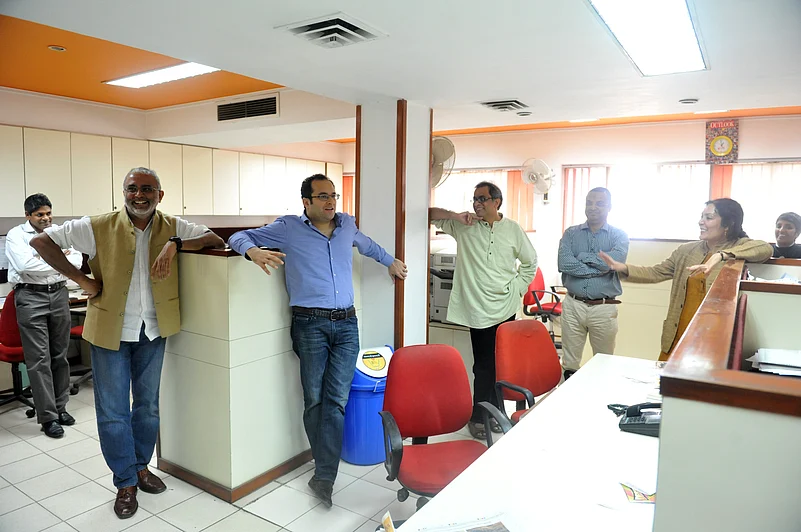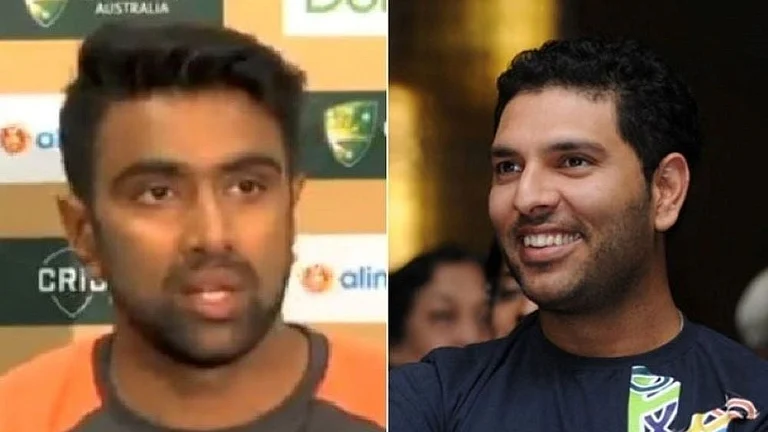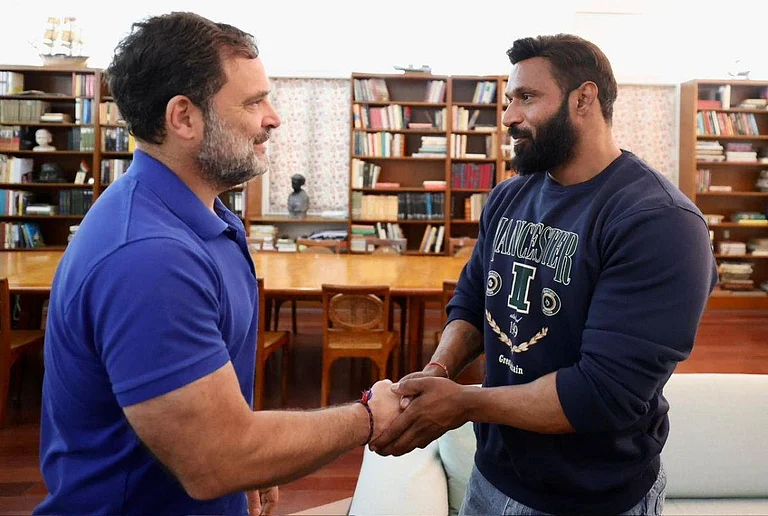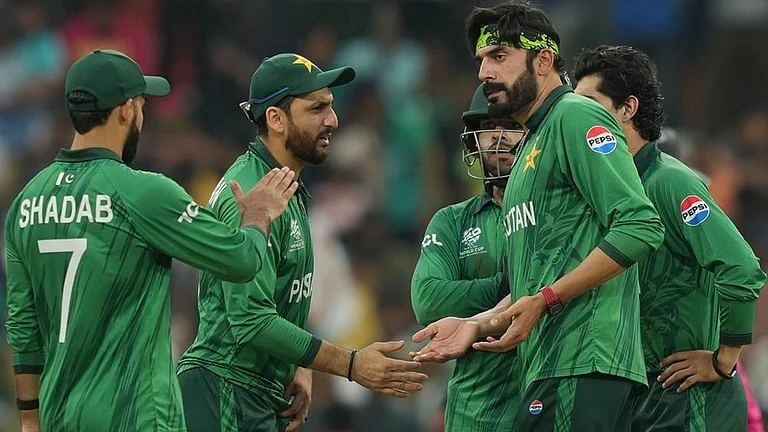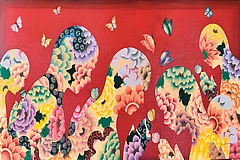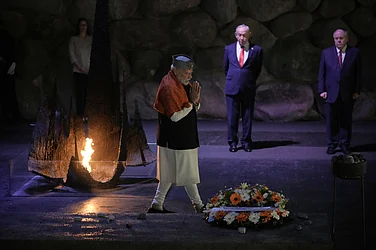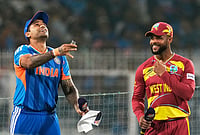The sheer excitement that the founding team of Outlook felt in 1995 is difficult to explain to anyone who wasn’t there. All of us, from the editors to the junior-most correspondent, believed that we were doing something that needed to be done. We were actually hoping that we could even transform Indian magazine journalism.
We were all knowingly taking a risk. India Today had an iron grip on the newsmagazine market and most people thought it was ridiculous that anyone could make a dent in its near-monopoly. All of us had comfortable jobs in established and profitable media companies. But once you met Vinod Mehta—quiet and relaxed—and the publisher Deepak Shourie—manically energetic and driven—you bought into their vision. We were all young. Vinod was in his early 50s, but all the other editors were in their early or mid-30s. All of us wanted to do something new.
Outlook began its life in two rooms in the government-run and quite run-down Lodhi Hotel, even as Deepak went around with real estate brokers and negotiated fiercely for a full office space. I joined on June 1, 1995. Deepak secured AB-10 Safdarjung Enclave within a month or so, and the office was inaugurated on August 15.

The magazine was launched on October 4 with a press conference addressed by Vinod. There was some issue with Vinod’s car, so we went to the launch in mine. A few minutes before we left, I had asked Vinod: “What do you feel?” After all, he had launched several magazines and newspapers and I had never worked in a start-up. “I’ve never felt so confident in my life,” he said. “All the magazines I founded, I never had good marketing support. This time, I have a good editorial team and Deepak is the best marketing man I’ve ever worked with.”
Back to AB-10. Deepak had got all the interiors done. But we thought that our cubicles were too small, and Tarun Tejpal boldly told Deepak and Vinod that this looked like an insult to us. Our work areas were expanded. Picture editor Prashant Panjiar and art director Bishwadeep Moitra also put their feet down and got the space that their departments needed.
My cubicle was next to Vinod’s room and if I leaned over to the right in my chair, I could see through his glass window what he was doing. Most of the time, I found that he was staring, befuddled, at his computer screen which said, “Irretrievable error.” To put it mildly, Vinod was not a very tech-savvy person. When his computer was being installed, he saw a mouse and a mousepad for the first time in his life and shouted: “I don’t want all this! Take this crap away!”

But within a few months, he figured out that I was watching him. He stuck paper on the window so that no one could look in. My life became more boring after this.
A year later, the internet arrived. We had two connections, one in Deepak’s room and one in Vinod’s. With Vinod’s permission, when he would go out for lunch (which was every day, though sometimes he was spotted having chhole bhature by himself at Aggarwal Sweet Home), I would go into his room, sit in his chair and surf the net. Because I had an engineering degree, that too in electronics, Vinod had decided that I was the tech guy in his team and was willing to give me that extra leeway to fiddle with his computer to access WWW stuff—I don’t think he ever bothered to get to know what that abbreviation stood for.
When I was working on a book on IITs and IITians, I asked him for three weeks leave to visit the US, much of which would be spent in Silicon Valley. “Three weeks in Bangalore?” he asked. “You’re writing a book on the IT industry?” I didn’t have the energy to explain the difference between IT and IIT and that Silicon Valley was in the San Francisco Bay area. He approved my leave application and I knew that he had no interest in whether I spent those days in Travancore or Tokyo.
Another magazine had an iron grip on the market and most people thought no one could make a dent.
In 1998, after a disastrous bungled-up attempt to launch India’s first personal finance magazine Intelligent Investor (now titled Outlook Money,) I was parachuted to Mumbai on a day’s notice to lead a rescue operation. I had to hire a whole new team, reorient the staff I had inherited and launch the magazine within three months. Prashant, Bishwadeep and I ended up spending four or five days every alternate week in Mumbai for six months.
I was enjoying living in a four-star hotel right on Juhu Beach every other week, but cost-wise, it made no business sense. So, I shifted the operations to Delhi, commandeering the basement of AB-10, which most of us had never visited before, and set up Outlook Money there. We now had two magazines out of AB-10. Vinod had no interest in Outlook Money and let me and Mahesh Peri do whatever we wanted.
I took over the basement, but Prashant, Outlook’s first and greatest picture editor, had already seized the terrace of AB-10. There, he constructed a dark room for developing photos (this was the pre-digital era). I’ve never been there, but there were stories that some people were using the seclusion of the space to watch films that they couldn’t watch in public. Prashant didn’t know. If he had, he would have read them the Riot Act.
Some of us used the rest of the terrace to play tennis ball cricket. The bat we used has an interesting history. We had sent Aniruddha Bahal to cover the Independence Cup in Dhaka in 1998. India won the final against Pakistan with some extraordinary batting by Sourav Ganguly and Robin Singh. Aniruddha got friendly with the Pakistani players (there’s another story there that Aniruddha may want to reveal at some point of time) and came back with a bat that had been autographed by the entire Pakistan team. He showed it to Vinod, who said, “Good” (he was a man of few words), took it and kept it in his room.
Aniruddha had certainly not expected this. So, he stole the bat from Vinod’s room during lunch, when Vinod was away, and we played cricket with it till all the autographs were roughed out. Every evening, Aniruddha would quietly put the bat back in Vinod’s room. As far as we know, Vinod never got an inkling of this. When a couple of Gujarat politicians came to visit him and he had called me in, he showed them the bat and said that this was the bat with which Azharuddin had been fixing matches.
I spent slightly more than 10 years in Outlook, the longest stint in a job that I have ever had.
I spent slightly more than 10 years in Outlook, the longest stint in a job that I have ever had. I joined as the Business Editor and grew to be the Managing Editor, the Number Two. The deadlines and printing schedules meant that some of us would end up staying in office till the dead of night, and the desk, led by Sunil Menon, would be there till dawn broke. But the market complex in which AB-10 stands never really went to sleep. There was a highly popular dhaba—it may still be there; I wouldn’t know because I haven’t visited for a decade—that drew more and more customers as the night grew older.
There was a liquor shop next door and by midnight, the parking lot would be filled with boisterous people drinking from paper cups and chewing their tandoori chickens. We were apprehensive that this could pose a danger to Outlook’s women staff who were leaving for home late at night, but as far as I know, there were no incidents.
Vinod was the best boss I have ever had, though he changed in the later years and I often found him infuriating. In fact, cribbing about Vinod became a small-scale industry within Outlook. When I look back at that, I realise that we were just letting off steam. At the end of each crib session, when we went back to work, we felt happier and more relaxed. No management book ever tells us this, but cribbing passionately but without malice about your boss can actually make for a better workplace. Of course, the key point here is that the disgruntled employee is still committed to his organisation.
We were often irritated by Vinod, but we also knew that there was always so much that we could learn from him. Whenever I think back about my Outlook and AB-10 years, one little incident stands out.
I got a panicked call from my wife. Our two-year-old daughter had got her hand stuck in a door and was bleeding profusely; I needed to come immediately and take her to a hospital. I went into Vinod’s room and said: “Vinod, my daughter…” He cut me off and said just one word. “Go.”
It was the most profound show of managerial alertness and competence that I have ever seen or heard of. If someone barges in and says “daughter”, it’s obviously some sort of crisis. As a boss and an enabler, you don’t need to know the details; you just free that person to handle it.
For me, and for many other colleagues, Outlook was personal—not only professional. Vinod was a miser and paid us less than industry standards. After one year in Outlook, when Vinod sent us the increment letters, we protested—this was very little, below the inflation rate, we said. Tarun wrote out the formal letter which we signed. Vinod said he would do better next time (he didn’t.)
But he was a kind man in many ways. Though sometimes it led to unintended consequences.
At the first anniversary party of Outlook, Vinod hugged me and said: “This is all because of you people.” I don’t know why, but I was probably the only person who had brought their spouse and child to the party. Vinod picked up my daughter, one-and-a-half-years old then, stopped a steward going around with a tray of beverages and ordered him to serve one to her.
Neither Vinod nor any of us knew that the dark liquid in the glass was rum and cola, not just cola. My daughter gulped it down and then slept for the next 20 hours.
MORE FROM THIS ISSUE
Three years after leaving Outlook, when I was setting up a magazine, Open, and hunting for office space, I decided on a three-storey building with a basement. I got all the workspace allotment and interior work done. It was only months later that I realised that I had sub-consciously replicated the AB-10 of 1995 on 2008 terms of furniture, fashion and technology. In a way, I had never left AB-10.







